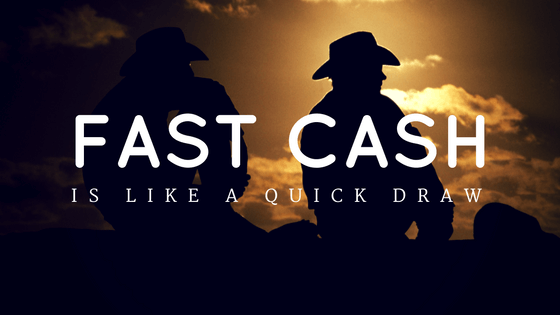A new report from the Harvard Business School equates fast-cash loans for small businesses to the wild west. If you’ve seen episodes of the new HBO show Westworld, then you probably realize the wild west is not a place you want to be. Old-timey westerns like Gunsmoke and Bonanza, or everyone’s favorite cowboy, John Wayne, glorify the notion of the wild west, but if you were to step back in time to the lawless frontier territories of the late 1800s, you’d probably feel more like a host of Westworld’s futuristic theme park where mayhem is the rule than one of Ben Cartwright’s heroic sons.
Fast-cash loans for small businesses are the same way; in theory, they seem like a great idea- a way to get money quickly without going through the hassle of a bank. For small businesses just starting out, fast money would seem like the perfect solution to jumpstart their businesses by investing in the equipment and technology needed to get started and worrying about paying it back later. However, as with many things in life, there’s a catch.
The sector of alternative small-business lending has really taken off in the last few years, with the emergence of the new fintech (financial technology) industry. A few years ago, businesses would have to go through a bank to get a loan, providing various information and data like tax returns and financial statements. The whole process would take weeks or even months. It was especially difficult for small businesses to secure the loans they needed due to a credit gap, a lack of funds available for small businesses requiring smaller amounts of money, usually less than $250,000. Now, thanks to advancements in technology, a series of digital platforms exist, such as Quickbooks Financing, Lendio, Fundera, and NerdWallet, that connect small businesses with lending companies of a sometimes-dubious nature, such as Lending Club, OnDeck, BlueVine, FundBox, Kabbage, and Prosper.
Because fintech lenders rely on more digitized methods than traditional bankers, their process of getting money to small businesses is typically much more efficient. But here’s the catch: these lending companies don’t offer their services without a steep price to pay. They often charge exorbitant interest rates and hidden fees because federal regulators do not have control over small-business borrowing in the way that they do consumer borrowing. The Truth in Lending Act does not apply to small business transactions. According to USA Today, “A short-term loan can turn into a long-term nightmare.”
The Harvard Business School report identified the main problems with this type of lending, as well as potential solutions, which are as follows:
Problems
- High costs: Lenders typically charge small business borrowers APRs (annual percentage rates) between 50 and 300 percent.
- Additional and hidden fees: Borrowers are slammed with additional fees when they renew their loans and stacking (when multiple lenders give loans to the same borrower) can occur, resulting in additional and hidden fees. Also, unlike traditional loans, many of these fast-cash lenders require payment of the full interest even when loans are paid off early.
- Misguided advice: Fast-cash brokers will often persuade small businesses to take out larger loans because they get the highest fees on them.
Solutions
- Mandatory disclosure of APRs, fees, default rates and borrower satisfaction
- An option to regulate nationally rather than state-by-state
- Greater borrower security for small-business owners
- Rules/guidance on partnerships between banks and new lending companies
- Digital broker platforms should act in the borrowers’ best interests and disclose any conflicts of interest
As it is now, the fast-cash system of lending to small businesses is far from perfect; however, as with most new forms of technology, there’s certainly potential there: “There’s so much promise in the rise of lending to small-business market,” said Brayden McCarthy, co-author of the report. “It’s been ignored for a long time, but we want to make sure that disclosures are robust enough so borrowers know what they’re getting into.” It is especially important in the United States, entering into a new Presidency, that both lenders and borrowers are protected, co-author Karen Gordon Mills explained. Hopefully, once all the kinks are worked out, this fast-cash lending system will be a little more tame and a little less wild.
